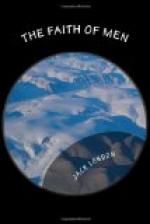I knew there were big deeds and wild doings behind that sigh, so I haled him into a corner, between a roulette outfit and a poker layout, and waited for his tongue to thaw.
“Had one objection to Moosu,” he began, cocking his head meditatively—“one objection, and only one. He was an Indian from over on the edge of the Chippewyan country, but the trouble was, he’d picked up a smattering of the Scriptures. Been campmate a season with a renegade French Canadian who’d studied for the church. Moosu’d never seen applied Christianity, and his head was crammed with miracles, battles, and dispensations, and what not he didn’t understand. Otherwise he was a good sort, and a handy man on trail or over a fire.
“We’d had a hard time together and were badly knocked out when we plumped upon Tattarat. Lost outfits and dogs crossing a divide in a fall blizzard, and our bellies clove to our backs and our clothes were in rags when we crawled into the village. They weren’t much surprised at seeing us—because of the whalemen—and gave us the meanest shack in the village to live in, and the worst of their leavings to live on. What struck me at the time as strange was that they left us strictly alone. But Moosu explained it.
“‘Shaman sick tumtum,’ he said, meaning the shaman, or medicine man, was jealous, and had advised the people to have nothing to do with us. From the little he’d seen of the whalemen, he’d learned that mine was a stronger race, and a wiser; so he’d only behaved as shamans have always behaved the world over. And before I get done, you’ll see how near right he was.
“‘These people have a law,’ said Mosu: ’whoso eats of meat must hunt. We be awkward, you and I, O master, in the weapons of this country; nor can we string bows nor fling spears after the manner approved. Wherefore the shaman and Tummasook, who is chief, have put their heads together, and it has been decreed that we work with the women and children in dragging in the meat and tending the wants of the hunters.’
“‘And this is very wrong,’ I made to answer; ’for we be better men, Moosu, than these people who walk in darkness. Further, we should rest and grow strong, for the way south is long, and on that trail the weak cannot prosper.’”
“‘But we have nothing,’ he objected, looking about him at the rotten timbers of the igloo, the stench of the ancient walrus meat that had been our supper disgusting his nostrils. ’And on this fare we cannot thrive. We have nothing save the bottle of “pain-killer,” which will not fill emptiness, so we must bend to the yoke of the unbeliever and become hewers of wood and drawers of water. And there be good things in this place, the which we may not have. Ah, master, never has my nose lied to me, and I have followed it to secret caches and among the fur-bales of the igloos. Good provender did these people extort from the poor whalemen, and this provender has wandered into few




